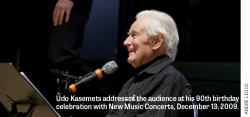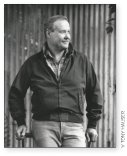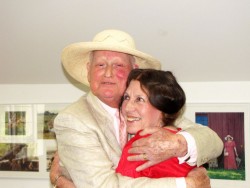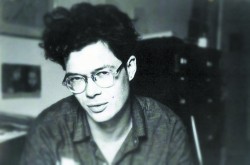Paul Willis - Counterpoint Community Orchestra Loses Former Concertmaster
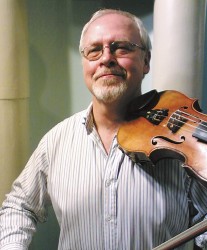 There is an empty seat at rehearsals these days as Counterpoint Community Orchestra (CCO) starts its 31st season. The group is missing one of its long-standing members, former concertmaster and former CCO Chair, Paul Willis.
There is an empty seat at rehearsals these days as Counterpoint Community Orchestra (CCO) starts its 31st season. The group is missing one of its long-standing members, former concertmaster and former CCO Chair, Paul Willis.
For 28 years, Paul brought passion, respect and talent to the group. He was diagnosed with pancreatic cancer and succumbed to his illness on July 21, ending a life of giving to the community and to his loving partner, Alex.
Paul was CCO’s biggest advocate and gathered immense community support with his friendly and persuasive manner. On June 7, Paul was invited on stage by music director Terry Kowalczuk to honour his contributions at the 30th anniversary concert. It meant a lot to Paul to live to see CCO turn 30 and take part in WorldPride 2014 in Toronto. Paul left Counterpoint a generous bequest to hire a young person to fill the concertmaster chair for many years to come.
The orchestra is celebrating the life of Paul Willis on Saturday, November 8, 7pm, location TBA, where his favourite piece, Méditation from the opera Thaïs, will be performed by current concertmaster Emma Vachon-Tweney.
The concert will be a fitting tribute by the orchestra to a member who played with his heart at every concert. Paul studied violin and graduated from the University of Western Ontario’s music program. He went on to law school and ran a successful law practice with his legal assistant Deborah Visconti for 25 years.
Paul was a proud gay man and helped to build Toronto’s LGBTQ community in the 1980s. He was a member of “The Body Politic” collective that regularly published a newspaper that united LGBTQ people and helped them stand up for equal rights. His commitment and contributions resonated with the LGBTQ community.
Paul joined Counterpoint soon after it was founded as a safe space for gay musicians in 1984, having set aside his violin for a short time. It was a powerful experience for Paul and he thrived in a community of acceptance.
“In the early years of Counterpoint, he participated in our first executive committee and instilled the openness and love of our community in the Counterpoint constitution. During one season when we didn’t have a conductor, he even conducted the season from the concertmaster’s chair, which he occupied for many years,” said Bill McQueen, one of CCO’s founding members.
Paul rallied community support for CCO for many years and served on CCO’s first orchestra board in 2005. As CCO’s chair from 2007 to 2009, Paul helped build the orchestra into a strong community organization and set the stage for current chair, Lana Chou Hoyt.
“I saw Paul’s passion and drive while he built Counterpoint from the ground up. Paul’s leadership helped pave the way for Counterpoint for many years to come. Building a community group takes teamwork. Paul Willis was certainly the glue that kept the team together for close to 30 years,” she said.
Paul is also fondly remembered for his open and cheerful personality.
“Many members of the orchestra and the audience find our early memories of this orchestra are inextricably linked to Paul, who graced the first chair not only with his playing, but also his unrelenting smile and gracious manner,” said CCO member David Beattie.
As a great example of Paul’s giving spirit, he donated his violin to his alma mater, the University of Western Ontario Faculty of Music, so that its melody, and indirectly Paul’s musical spirit, will live on.
By Counterpoint musicians: Trish Tervit, Lana Chou Hoyt and Bill McQueen. Trish Tervit is a violinist, a Toronto-based writer who began her career as a print journalist and now works as a public relations professional. Lana Chou Hoyt is a flutist and current CCO chair. Bill McQueen is a clarinetist, founding member of CCO and former chair.


